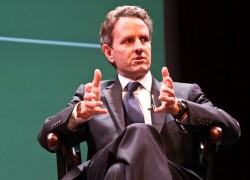
Four years after taking the helm at the height of the financial crisis, Treasury Secretary Timothy Geithner is stepping down. President Barack Obama nominated White House Chief of Staff Jack Lew to replace him, and, pending Senate approval, Lew will take over by the end of January.
Geithner is the second Dartmouth alumnus to occupy the position after Henry Paulson Jr., who led the department from 2006 to 2009 under former President George W. Bush, according to government professor Linda Fowler. “It is quite unusual that two Dartmouth alumni served back-to-back as Secretary of the Treasury,” Fowler said. “Paulson and Geithner both faced extraordinarily challenging times, and more historical perspective is needed to properly evaluate their tenure.”
Geithner took over as the 75th Treasury Secretary in January of 2009 after leading the New York Federal Reserve.
He presided over the Treasury during one of the country’s most difficult economic times, according to Domenico Lombardi, president of the Oxford Institute for Economic Policy.
“It is unclear what anyone else would have done in his position,” Lombardi said.
During his tenure, Geithner oversaw the Dodd-Frank Act, which gave the Treasury broader powers to act against companies that endanger the financial system. He also directed the allocation of $350 billion from the Troubled Asset Relief Program, according to Lombardi.
Geithner’s approach to his role stood in stark contrast to that of his predecessors, Lombardi said. Specifically, Geither made a point of attending meetings like the International Monetary and Financial Committee and his efforts did not go unnoticed, according to Lombardi.
Geithner was an interesting choice because he was one of the first secretaries to be promoted from within the Treasury’s rank.
“He is known for being very approachable and having excellent relationships with policymakers,” Lombardi said.
Geitner’s strong background, including fluency in Japanese and Chinese Mandarin, made him a valuable asset to the Treasury. At Dartmouth, Geithner was a double major in government and Asian studies with a concentration in Chinese, and he travelled to China through the Beijing Foreign Study Program.
“Through his very public presence, Geithner helped to reassert the role of the United States at the apex of the fiscal crisis,” Lombardi said. “He managed to maintain a very effective relationship with figures like Ben Bernanke and together they have managed to contribute greatly to resolving the crisis.”
During the last months of his tenure, Geithner assisted Obama in formulating a deal to avoid the fiscal cliff. Geithner attempted to leave office in June of 2011, but stayed on per Obama’s request until a deal was made.
Government professor Brendan Nyhan said that Geithner’s work has likely played a significant role in influencing public opinion of Obama.
“If there is one aspect of the president’s record that will constantly be debated, it is his economic record and, in that regard, I expect Timothy Geithner to get a great deal of scrutiny,” Nyhan said.
Geithner has not announced any specific future plans. Lombardi, however. said he expects that Geithner will be in high demand
Lew will take over where Geithner left off if he is approved. Under a precedent set by Geithner, the incoming Treasury Secretary will take a larger role in defining the president’s economic agenda, according to Lombardi. Lew will work to create the second part of the fiscal cliff deal that concerns federal cuts to discretionary spending. As part of his new responsibilities as Treasury secretary, he will oversee spending for Social Security, Medicare and Medicaid as well as tax revenue allocation.
